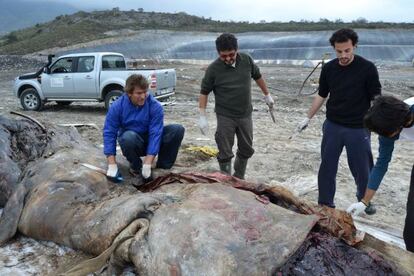A plastic killer lurking in the deep
Sperm whale found with 59 pieces of greenhouse sheeting in its stomach

On March 28 of last year, a 10-meter-long, 4.5-ton sperm whale was found dead on a beach in Castell de Ferro, in Granada. Following what has been a regular routine for the last few years in this type of case, the Andalusia regional government called in a team from the Doñana Biology Station to take samples from the animal and analyze its feeding patterns.
But there was a surprise in store for the team, which was led by Renaud de Stephanis. When they opened up the whale, they found 59 pieces of plastic sheeting, of the type used by nearby greenhouses to protect crops. The animal had ingested nearly 18 kilograms of the material. The plastic had caused one of the whale’s stomachs to burst, leaving it dead. This is the fourth such documented case in the world, and the details have been accepted for future publication in the scientific journal Marine Pollution Bulletin.
De Stephanis remembers that when he first opened up the sperm whale, he thought there must be some kind of mistake. “I was thinking, ‘Who on earth put plastic in here? What is this?’” And plastic was not the only thing they found inside the beast’s stomach: there were also two flowerpots and a spray can, among other debris.
De Stephanis, who spent several summers in Almería, recognized the objects as typical of the greenhouses that cover much of the coast between Murcia and Málaga.
The 4.5-ton whale turned up dead on a beach in Castell de Ferro, Granada
“The stomach had exploded and the gastric contents had ended up in the abdominal cavity,” De Stephanis explains, adding that the animal showed signs of malnutrition and that there was no evidence of recent feeding.
The study goes as far as to specify that the whale had also swallowed nine meters of the kind of rope used to hold the plastic sheets down, as well as two hoses, measuring 4.5 meters.
It was already a well-known fact that plastic is a leading cause of death for 250 marine species, including fish, turtles and birds. Until now, however, there had only been three documented cases of sperm whales being killed by plastic pollutants: two in California and one in Greece.
Researchers also analyzed the distribution of the species and found that, as well as the Strait of Gibraltar, sperm whales are found near western Almería and Granada, where the sea of plastic sheeting is especially abundant. The town of El Ejido alone produces 45,000 tons of greenhouse plastic, and the province of Almería has nearly 40,000 hectares covered by a canopy of polymer. A study by the Andalusian government found that “the production of plastic greenhouse waste is an estimated 2,400 kilograms per year and a hectare of long-lasting polyethylene.”
The regional government has two plants to treat this plastic waste, one in Seville and another one in El Ejido, but researchers note that the wind often blows the litter out to sea.
Unfortunately, the beached whale was not identified, so it is impossible to know where its regular hunting grounds were. De Stephanis explains that sperm whales dive as far as 1,000 meters down in search of squid, and that they may mistake plastics for prey, or perhaps swallow the waste material accidentally.
Tu suscripción se está usando en otro dispositivo
¿Quieres añadir otro usuario a tu suscripción?
Si continúas leyendo en este dispositivo, no se podrá leer en el otro.
FlechaTu suscripción se está usando en otro dispositivo y solo puedes acceder a EL PAÍS desde un dispositivo a la vez.
Si quieres compartir tu cuenta, cambia tu suscripción a la modalidad Premium, así podrás añadir otro usuario. Cada uno accederá con su propia cuenta de email, lo que os permitirá personalizar vuestra experiencia en EL PAÍS.
¿Tienes una suscripción de empresa? Accede aquí para contratar más cuentas.
En el caso de no saber quién está usando tu cuenta, te recomendamos cambiar tu contraseña aquí.
Si decides continuar compartiendo tu cuenta, este mensaje se mostrará en tu dispositivo y en el de la otra persona que está usando tu cuenta de forma indefinida, afectando a tu experiencia de lectura. Puedes consultar aquí los términos y condiciones de la suscripción digital.








































